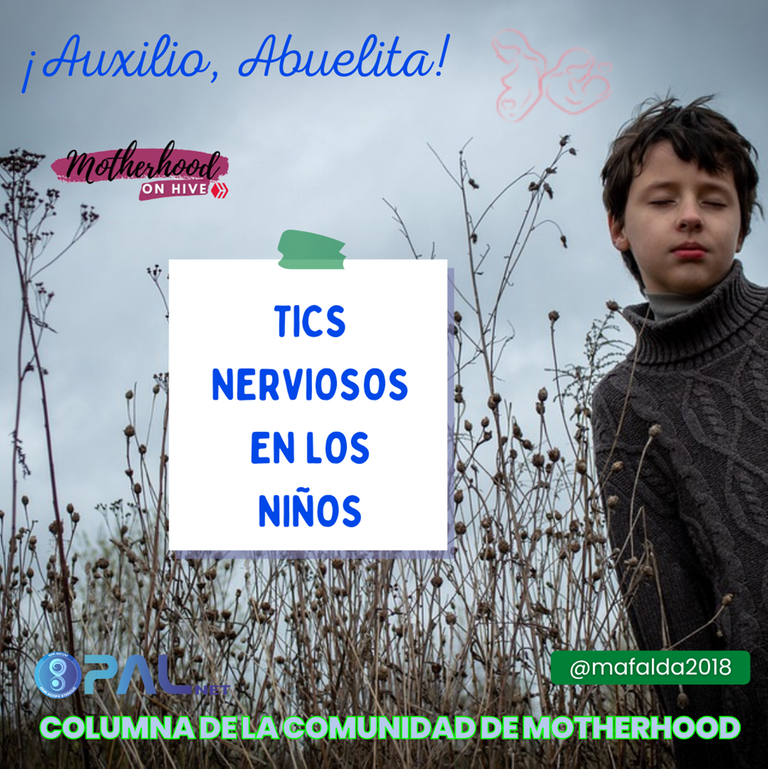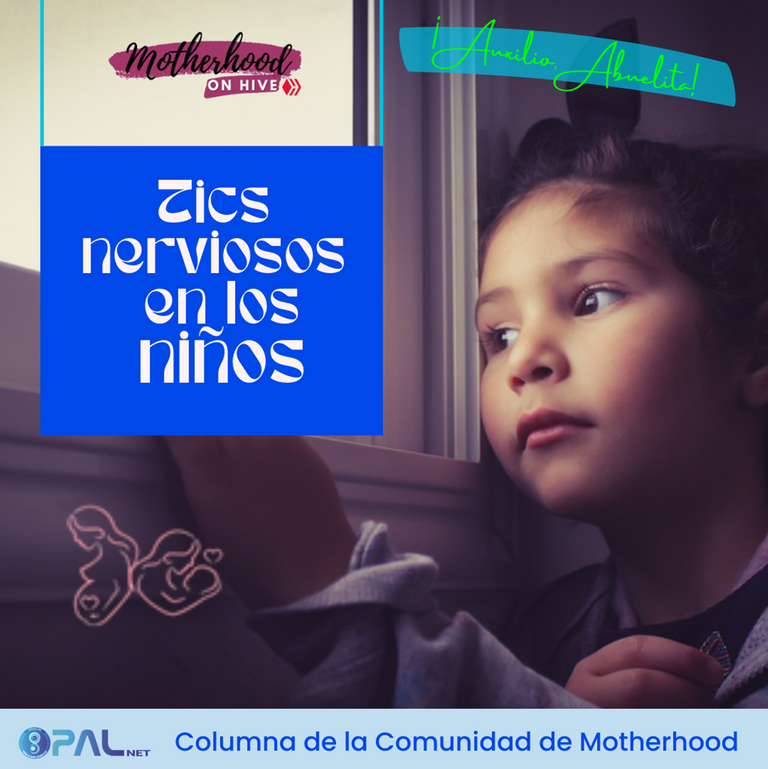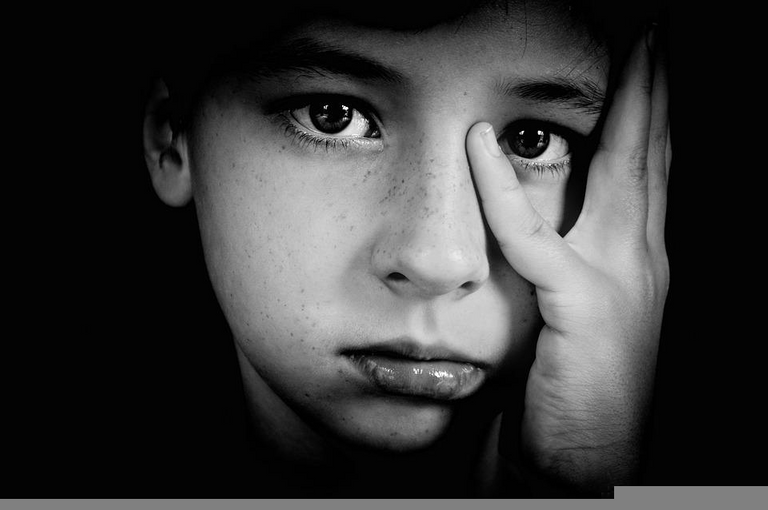
“El mejor tipo de padre que puedes ser es predicar con el ejemplo.”
(Drew Barrymore)
Columna Semanal de la Abuelita
Bienvenidos a la columna ¡Auxilio, abuelita!… amigos de #Motherhood, donde encontraran respuestas y consejitos para enfrentar algunos problemas en la crianza de sus hijos. Esta semana hablaremos sobre los tics nerviosos en los niños, causas y sus consecuencias. Así mismo, las opiniones y consejos de expertos. También sobre la importancia de inculcar a los hijos el respeto hacia otros seres humanos.
“No hay tal cosa como un padre perfecto. Así que solo sé uno real.”
(Sue Atkins)

Los niños, la mayoría de las veces por miedo, introversión o baja autoestima, tienden a desarrollar pequeños gestos que con el tiempo pueden llegar a ser problemáticos. Cuando esto se manifiesta, los padres tienden a maltratarlos físicamente o darle reprimendas verbales. Sin embargo, hay que tener cuidado porque estos movimientos, a los que llamamos tics, son ocasionados por traumas emocionales de los niños.También estos tics pueden ser verbales.
Generalmente, a los niños les da vergüenza hacer estos movimientos involuntarios, y esto suelen manifestarse cuando están sometidos a estrés, ansiosos y con emociones fuertes como la alegría y tristeza. Cualquier cambio en su zona de confort y que los afecte, desencadenará un movimiento involuntario. Los padres deben estar pendiente porque puede suceder que no se les quiten y sean causados por el sistema nervioso.
Los niños son muy susceptibles, esto afecta su comportamiento y la manera de expresarse. Cuando no pueden con lo que sienten y se estresan, desarrollan tics nerviosos. Los padres deben observar bien cualquier movimiento físico de los niños, tales como pestañear, rascarse la cabeza, mover los brazos, picar los ojos, rascarse la nariz y el mentón, toser, tartamudear, entre otros. Alex Bayortien en el blog de www.psicoadapta.es, expuso en la publicación titulada: “Cuidado con los tics nerviosos en niños: cuándo deberías preocuparte” lo siguiente:
“Los tics nerviosos en la infancia pueden llegar a ser muy dolorosos a nivel psicológico…” Para más información visite aquí
La mayoría de las veces los tics no perduran y cuando lo hacen hay que llevar a los niños a un psicólogo, ya que puede ser causados por una enfermedad, es por esta razón que hay que estar pendientes con los chiquitos de la casa. Sobre este tema M. Cristina Victorio publico un artículo titulado: “Síndrome de Tourette y otros trastornos con tics en niños y adolescentes (síndrome de Tourette)” en la página www.msdmanuals.com y me resulto muy interesante, se los traje para que lo lean, les dejo el link:
Es importante que cuando los padres hayan logrado detectar algunos tics nerviosos en sus hijos, además de llevarlos al psicólogo, estén muy pendiente para que no sean sometidos a bullying en el entorno donde se desenvuelven, sobre todo en la escuela. Algunos niños a veces han tendido a asumir conductas agresivas, y a veces hasta crueles. Quizás puede ser porque provienen de hogares donde los padres no les han enseñado a sus niños sobre el respeto y la comprensión.
Si se atiende a tiempo, estos trastornos garantizarán niños más sanos a nivel emocional, con la finalidad de elevar su autoestima. Por otro lado, los familiares y amigos deben apoyar en la mayoría a los niños con trastorno o síndrome de Tourette. Cabe destacar que los niños no son culpables de padecer esto y necesitan mucho apoyo de parte de su familia y amigos para que se sientan amados y protegido.
En mi caso, todavía tengo un tic nervioso, que no he logrado por nada dejar de un lado, de donde proviene y que lo origino no lo sé. Tampoco sé si es un trastorno, lo que si sé es que cuando estoy muy nerviosa y ansiosa, toco mis orejas. Siento estas se me ponen caliente y también trato de protegerlas. OMG, mi madre iba detrás de mí recogiendo mis zarcillos. Hasta que un día decidí no usarlos más.
“La marca más importante que voy a dejar en este mundo es mi hijo”.
(Sarah Shahi)

Fuente
Imagen capturada desde pixabay, propiedad de langll

• Mantener la calma y no estar constantemente encima del niño maltratándolo.
• No deben obligar a los niños a realizar sus actividades diarias.
• Planear salidas al aire libre para que se distraiga.
• No los obligue a hacer deporte si no lo desean.
• Inculcar el respeto.
“Nada dice más del alma de una sociedad que la forma en que trata a sus hijos”.
(Nelson Mandela)
Amigos de #Hive, participa en la Comunidad de #Motherhood. Hay muchas actividades que serán de su agrado tales como: Retos, #SpreadLoveChallenge. Tambien las curaciones de los días miércoles a las 5:00 P.M hora Venezuela en Pal.

Amigos de #Motherhood, hay que educar a los niños con respeto y consideración para que ellos tengan actitudes positivas ante la vida, tomen decisiones objetivas y no se dejen engañar. Además, ellos aprenden con los ejemplos de los padres; hay muchos adultos con traumas que nunca pueden superar porque no logran perdonar a sus padres. Esto no los deja crecer emocionalmente, consolidar relaciones y les impide disfrutar del presente.
Gracias por visitar la Columna ¡Auxilio, abuelita!, hasta la próxima semana. Los quiero.
Namasté
“Los niños son educados por lo que el adulto es y no por su charla”.
(Carl Jung)

Fuente
Imagen capturada desde pixabay, propiedad de Simedblack
(En)
"The best kind of parent you can be is to lead by example."
(Drew Barrymore)
Grandma's Weekly Column
Welcome to the column Help, Grandma!... friends of #Motherhood, where you will find answers and tips to face some problems in raising your children. This week we will talk about nervous tics in children, causes and consequences. Also, opinions and advice from experts. Also about the importance of instilling in children the respect towards other human beings.
“A mother's heart is the child's school."
(Henry Ward Beecher )

Children, most of the time due to fear, introversion or low self-esteem, tend to develop small gestures that over time can become problematic. When this manifests itself, parents tend to physically abuse them or verbally reprimand them. However, it is necessary to be careful because these movements, which we call tics, are caused by emotional traumas of the children. Also these tics can be verbal.
Generally, children are embarrassed to make these involuntary movements, and this usually manifests itself when they are under stress, anxious and with strong emotions such as joy and sadness. Any change in their comfort zone that affects them will trigger an involuntary movement. Parents should be vigilant because it may happen that they do not go away and are caused by the nervous system.
Children are very susceptible, this affects their behavior and the way they express themselves. When they cannot cope with what they feel and get stressed, they develop nervous tics. Parents should observe well any physical movement of children, such as blinking, scratching the head, moving the arms, itching the eyes, scratching the nose and chin, coughing, stuttering, among others. Alex Bayortien in the blog of www.psicoadapta.es, exposed in the publication titled: "Beware of nervous tics in children: when you should worry" the following thing:
Nervous tics in childhood can become very painful on a psychological level..."
For more information visit aquí
Most of the times the tics do not last and when they do it is necessary to take the children to a psychologist, since it can be caused by a disease, it is for this reason that it is necessary to be alert with the little ones of the house. On this topic M. Cristina Victorio published an article titled: "Syndrome of Tourette and other disorders with tics in children and adolescents (syndrome of Tourette)" in the page www.msdmanuals.com and I found it very interesting, I brought it to you so that you read it, I leave you the link:
It is important that when parents have managed to detect some nervous tics in their children, in addition to taking them to the psychologist, to be very attentive so that they are not subjected to bullying in the environment where they develop, especially at school. Some children have sometimes tended to assume aggressive and sometimes even cruel behaviors. Perhaps it may be because they come from homes where parents have not taught their children about respect and understanding.
If addressed in time, these disorders will ensure healthier children on an emotional level, with the aim of raising their self-esteem. On the other hand, family members and friends should be supportive of children with Tourette's syndrome or disorder. It should be noted that children are not to blame for suffering from this and they need a lot of support from their family and friends so that they feel loved and protected.
In my case, I still have a nervous tic, which I have not been able to stop for nothing, I do not know where it comes from and what caused it. I don't know if it is a disorder either, what I do know is that when I am very nervous and anxious, I touch my ears. I feel them get hot and I also try to protect them. OMG, my mother would go after me picking up my earrings. Until one day I decided not to wear them anymore.
" The most important mark I will leave on this world is my son."
(Sarah Shahi)

Fuente
Imagen capturada desde pixabay, propiedad de Victoria_rt

Remain calm and do not constantly be on top of the child and mistreat him/her.
Do not force children to do their daily activities.
Plan outings outdoors to distract them.
Do not force them to play sports if they do not want to.
Instill respect.
"Nothing says more about the soul of a society than the way it treats its children."
(Nelson Mandela)
</center
Friends of #Hive, participate in the #Motherhood Community. There are many activities that you will enjoy such as: Challenges, #SpreadLoveChallenge. Also the healings on Wednesdays at 5:00 P.M. Venezuela time in Pal.

Friends of #Motherhood, we must educate children with respect and consideration so that they have positive attitudes towards life, make objective decisions and do not allow themselves to be deceived. In addition, they learn from their parents' examples; there are many adults with traumas that they can never overcome because they are unable to forgive their parents. This does not allow them to grow emotionally, consolidate relationships and prevents them from enjoying the present.
Thank you for visiting the Column Help, grandma!, see you next week. I love you.
Namasté

" Children are educated by what the adult is and not by his talk."
(Carl Jung)

Todas las imagenes son de pixabay y la primera del niño es de Victoria_rt, les dejo el reconocimiento
All images are from pixabay and the first one of the child is from Victoria_rt , I leave you the acknowledgement:

Los separadores fueron diseñados en CANVA.
The rewards earned on this comment will go directly to the people sharing the post on Twitter as long as they are registered with @poshtoken. Sign up at https://hiveposh.com.
Parents should always observe their children no matter what. Remember that our children are easy to adapt to any forms of changes that comes their way.
Hola @abigail04 considero que los niños aparentemente aceptan los cambios pero no es asi, esto les causa estres y ansiedad, lo cual puede desencadenar comportamientos negativos y ademas desarrollar tics nerviosos.
Un abrazo
Así es, cuando un niño manifiesta algún tic es común ver a los padres, reclamándoles y llamándoles la atención de forma errónea y constantemente por esto, haciendo que precisamente el problema se acreciente. Muchas gracias por tus fabulosos consejos.
Algunos padres no logran entender que los niños merecen respeto y es en su hogar donde aprenden y son educados para enfrentarse al mundo. Es por esta razón que el respeto es primordial, para que sean hombres y mujeres de bien y empaticos con su entorno. Es labor de los padres educar con respeto y consideración.
Un abrazo
Un tema muy interesante y bastante común diría yo, he visto niños con tics y ha algunos se les pasa y a otros solo cambian de tics es duro para ellos y para los padres también. Saludos
La crianza es dificil porque todos los niños no son iguales pero si estamos pendientes se pueden solucionar muchos problemas que pueden afectar su futuro. Esto no se soluciona con maltratos fisicos y verbales, es solo con ayuda psicologica, apoyo y comprensión.
Un abrazo,
Excelente publicación, no conocía sobre este tema, me detendré a investigar un poco mas a fondo, ya que he observado que mi hijo Matthias cuando esta nervioso tiene un pequeño tics
Dear @mafalda2018,
May I ask you to review and support the Dev Marketing Proposal (https://peakd.com/me/proposals/232) we presented on Conference Day 1 at HiveFest?
The campaign aims to onboard new application developers to grow our ecosystem. If you missed the presentation, you can watch it on YouTube.
You cast your vote for the proposal on Peakd, Ecency,
Thank you!
Tenemos por mala costumbre inferir que todo es una maña de los niños o simplemente manipulaciones. Lamentablemente, descuidamos las verdaderas razones por las cuales se manifiestan ciertas patologias. Es oportuna esta publicación, alertar a los padres siempre será importante. Saludos abuelita @mafalda2018.
Feliz día abuelita @mafalda2018, que interesante tema porque he visto que algunos padres por desconocimiento piensan que son mañas que agarran sus hijos y hasta los golpean para que deje de hacerlo cuando por lo general son involuntarios.
Recuerdo que a una de mis hermanas le temblaba un ojo, era hasta gracioso, pero era involuntario, cuando la llevaron al médico le prohibieron el café porque era una alteración nerviosa.
Que bueno que toques este tema, me pareció muy bueno, sobre todos tus buenos consejos abuelita, los niños necesitan distraerse porque ellos también se cansan y se estresan.
Saludos, Abuelita @mafalda2018, que tengas lindo día.